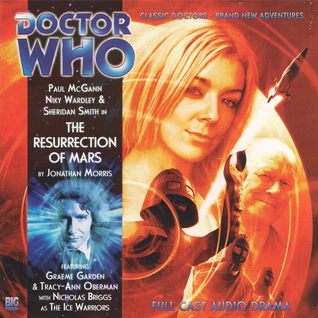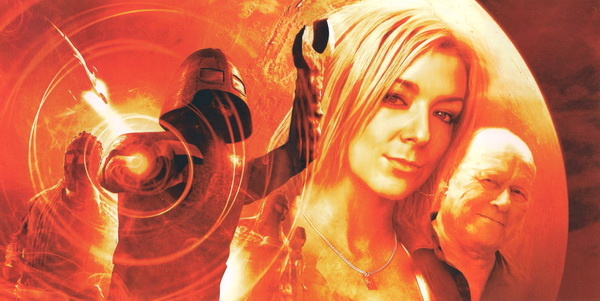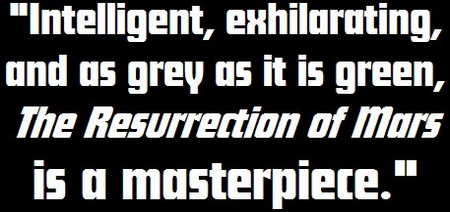|
| |
|
STORY PLACEMENT THIS STORY TAKES PLACE IMMEDIATELY AFTER THE BIG FINISH AUDIO "DEIMOS" AND PRIOR TO THE BIG FINISH AUDIO DRAMA "RELATIVE DIMENSIONS."
WRITTEN BY JONATHAN MORRIS
DIRECTED BY BARNABY EDWARDS
RECOMMENDED PURCHASE BIG FINISH 8TH DOCTOR CD#4.06 (ISBN 1-8443 5-480-1) RELEASED IN NOVEMBER 2010.
BLURB Deimos – where Lord Slaadek's plans to revive the ancient Ice Warrior civilisation hang by a thread.
Only the Doctor can stop him… but an old enemy, hiding in the catacombs, has an alternative plan. A plan that will test the Doctor's heroism to its limits.
Just how far will the Doctor go to prevent the destruction and resurrection of Mars – on a day when THE CLOSEST OF HIS friends become HIS enemies, and his enemies have right on their side?
|
|
|
The Resurrection of Mars NOVEMBER 2010 (2 EPISODES, PARTS 3 & 4 OF 4)
When Johnny Morris sat down to write The Resurrection of Mars, he didn’t simply dash off a synopsis or even weigh in with one of his trademark tone summaries. Instead, he wrote a 2,000 word essay about the issues that he wanted to explore in his story. This essay would give rise to the most thoughtful and provocative tale about the Doctor, his ethics, and the consequences that follow the decisions that he makes since The Waters of Mars.
I understand that Paul McGann had expressed a desire to really get to grips with the Time Lord’s inner workings, and this magnificent script certainly grants him his wish. These two episodes bombard with the Doctor with life and death decisions almost ad absurdum, and rather than depict him making those decisions with his usual poise, Morris offers us insight into the rationale behind each. We listen to the Doctor as explains why he has to champion the life of every single individual, and the dangers borne of using maths to make decisions. We hear the Doctor lamenting the dark deeds of his most recent life, and how, despite the best of intentions, he’d set himself down a road to hell that saw him become wretched and lonesome before ultimately dying alone.
The Doctor’s dark night of the soul is then expertly entangled with the Monk’s case for the opposition. This play sees erstwhile Goodie Graeme Garden present the most convincing and charismatic of Devil’s advocates, putting forward his case in a clear and logical manner and supporting each of his points with evidence of the coldest and hardest kind. The Monk is almost Palpatinian in his manoeuvrings here, as he seeks to corrupt the Doctor’s current companion, to replace the one that he’s recently “had to let go…”
Tamsin’s betrayal is clearly on the cards right from this production’s earliest scenes, but that does not mitigate its impact - the horror of this story is listening to Tamsin’s inexorable fall. What makes it so very galling is that her decision isn’t an unreasonable one; not after what the Monk’s shown her. Had Morris had the Doctor twirling a moustache here instead of the Monk, the listener might even be agreeing with her choice; it’s just a question of emphasis. Imagine being taken to an idyllic, Eden-like world and introduced to a serene society unique in all creation. Imagine being taken back to that same world a little later in its history, only to find it re-christened “Mars II” and inhabited by a reptilian race of conquerors. Imagine then being told that those conquerors had only come because, allegedly on a whim, the Doctor decided to prevent them taking back their homeworld from a few hundred thousand human colonists. Imagine being shown a piece of paper that says “300,000 dead, or 20,000,000, 000,000?” Niky Wardley gives her finest performance to date as credibly, understandably and totally tragically, Tamsin takes a turn to the dark side.
something of a different perspective. Having trav- elled with, and been burnt by, both the Doctor and the Monk, she is better placed than anybody to appreciate their faults. Much like Tamsin, the Doctor’s high-handed actions hurt her badly – a hurt that is still, by her own admission, “raw” – and, much like Tamsin, she was seduced by the Monk’s insouciant disregard of the Laws of Time when it came to furthering his “Greater Good”. However, most unlike Tamsin, Lucie could never countenance murder - no matter what the ends. She could never sacrifice one life, even it meant that billions would live as a result, and in a roundabout sort of way it is this fierce integrity that has brought her back to the Doctor’s side just in time for Christmas.
Sheridan Smith’s return is a truly joyous thing. Despite being burdened by a pained parting of ways and a really rather profound critque of the Doctor’s morality, Smith’s performance enlivens every scene that she appears in. Her rapport with Niky Wardley is electric – I can’t believe it’s taken nearly four years for Big Finish have Lucie threaten to “deck” somebody – and the adventures that she recounts from her time with the Monk almost had me salivating at the thought of a Lucie / Monk spin-off. This sense of fun then seems to saturate the whole production - we have jokes about the Death in Blackpool dating controversy; a couple of sweet old holidaymakers (superbly played by Nick Wilton and Susan Brown of Torchwood fame) chuntering as they vow never to go away again; even talk of “do-das” being strapped down. At its most profound, The Resurrection of Mars threatens to become overwhelmingly heavy, but thanks to Lucie Miller and the comedy that follows in her wake, this one manages to amuse almost as much as it arouses.
However, contrary to the title and cover of the play, the Ice Warriors are not really the focus of this one. In his author’s notes accompanying the preceding Deimos, Morris spoke about how he wanted to try and move away from the Ice Warriors’ “Klingon” nobility and take them back to the terror of the Troughton Years, and here that’s exactly how the old “Vikings from Mars” are used. With no time to spare for Martian posturing, this tale presents them simply as a green and nasty threat with a superlatively selfish plan, voiced not only by the rasping Nicholas Briggs, but by Sheridan Smith and Niky Wardley too. There’s a silent selling point.
In summary then, Deimos is good; The Resurrection of Mars is
a masterpiece. Intelligent, exhilarating, and as grey as it is green, this
is one of Paul McGann’s finest hours; and I dare say one of Sheridan Smith
and Niky Wardley’s too.
|
|
|
Copyright © E.G. Wolverson 2010
E.G. Wolverson has asserted his right under the Copyright, Designs and Patents Act, 1988 to be identified as the author of this work. |
|
|
Unless otherwise stated, all images on this site are copyrighted to the BBC and are used solely for promotional purposes. ‘Doctor Who’ is copyright © by the BBC. No copyright infringement is intended. |
|

.jpg)


 Lucie
Miller, however, has
Lucie
Miller, however, has